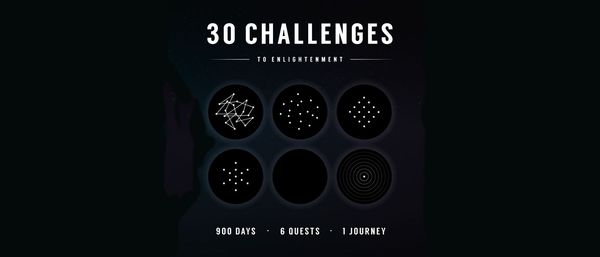Martijn Schirp • • 5 min read
How & Where To Educate Yourself Online

Generation after generation the human species stacks knowledge upon knowledge. This intricate web of symbols acts like a map for our inner and outer world. We use math to trade goods and we use words to convey we are in love. This is perhaps what we can call uniquely human and is arguably the most important activity we will ever do in our lives. Without it, we wouldn’t survive in the world we live in.
Education is learning how to use this knowledge in a clever way. For instance, you can learn how to be more effective in communication, you can learn how to calculate estimated profit for your new business plan or you can learn new symbols for the inner world so you can get more in touch with your body. What unites these different types of education is the drive for knowledge. It is the tool, and the only tool that actually helps us reach our goals. Whether you want to be a wall street banker, a professional athlete, a professor of philosophy or a shaman.
Today, this education is at our fingertips. Everybody knows that through the internet it is possible to access an enormous quantity of high quality information. Never before has it been possible to search and find resources for every topic you are interested in. Best of all, it is free. It is truly the modern-day version of the ancient library of Alexandria. Yet, at the same time this massive amount of choice paralyzes us. Where do I start? What do I want to learn? How can I commit myself to actually achieving my goals? To answer these questions, we need a strategy.
Picking A Subject
For some, this is a very easy step. For others, not so much. Either way, finding out on what topic you would like to spend your precious time is a crucial step. Start by asking yourself the following question.
1. What do you really want to know?
While most of us are interested in some basic understanding of physics, probably not many of us will pursue a Ph.D. In this case, introductory courses will be sufficient. But if you want to know how the inside of a star functions, you need both the introductory courses and nuclear physics.
If you want to know about particle physics, chances are you won’t be able to apply this knowledge. In this case, it might be better to use your time to learn something that lies closer to your day-to-day life. If you can see real life benefits it will be easier to stay motivated when things get tougher. (I am assuming that if you are reading this article you will try to tackle information (way) beyond your current capabilities.)
- A great resource for math, economics and physics is www.khanacademy.org
Planning Your Schedule
To learn a subject in-depth you need to really delve into it and commit yourself to studying. Chances are you will find some aspects of the subject quite tedious and/or difficult. Yet, these also have to be mastered at one point to get a clear and whole understanding. This is the hard part of self-education, to motivate yourself long enough untill you mastered your goal. A key aspect to overcome this difficulty is making a schedule so you can reach the goals you have set for yourself.
4. In what time would you like to understand your chosen subject?
It is important not to plan too much time or not enough time. Of course you can change your deadline later, but make sure you keep disciplined. It is too easy to quit if you haven’t studied in a while and it is to easy to postpone studying if you feel like you have enough time. If you feel you can’t trust your future-self to actually engage in the studying, commit him/her by placing a bet on whether you make it or not with a friend. This is called pre-commitment or a commitment device.
5. How many days a week and how many hours a day would you like to study?
Many of us watch too much television or aimlessly surf the web for too long. What if you spend only a fraction of this time to study the subject you always wanted to know? A daily hour of learning a new language will soon add up to a significant understanding. As with all the questions in this article, try to be as realistic (without aiming too low!) as you can be (but try to a little each day). Failed goals and expectations can have a detrimental effect.
- A great resource for learning new languages is www.duolingo.com
- Everything about numbers can be found at www.numberphile.com
Learning The Vocabulary
Before you start dipping your toes in unexplored territory make sure you are well prepared. If you make a glossary of new words it will help you to understand and memorize new-found terminology. So if you find some concept you did not know before, search it and write it down. This is crucial because the vocabulary used in sociology can be very different, for instance, than what is used in philosophy.
If you use a computer it can save a lot of time if you either use Google Dictionary App for Chrome or for Mozilla Firefox (double-click on a word and it will search all definitions of it on the web.) In some cases Wikipedia.org can give you a quick and easy introduction to the concept you are trying to understand. Copy the essential parts into your glossary for a quick reminder if you are tackling a difficult paper, video or lecture.
- Great videos about symbols of physics and astronomy can be found at www.sixtysymbols.com
- A great way to learn how to code (programs, websites etc.) can be found at www.codecademy.com
Finding The Right Source
6. Do I know where to start?
There was a time where most information online was dubious at best. Recently, that has changed. Most reliable academic institutions put their best lectures online, free to watch. Generally I would recommend listening or watching a lecture for at least 30 min a day, 5 days a week. It is better to do small pieces each day than large junks once a week. Starting out with lectures gives an easy pace introduction and enough time to build up your glossary. For good sources, read Educate Yourself Without School here. Other good sources can be found here:
And here are two very long lists of sources:
Finding A Community
Nothing teaches better than interacting and communicating your knowledge with others. Specific questions to be answered and problems to be tackled should really get your gears working. Hanging out in a group of like-minded individuals can really help you understand a subject on a much deeper level. By lurking for a while you can make sure the community is what you are looking for. Don’t forget to do some research on how to utilize it the best you can.
- You can find such a community of organic home growers at www.windowfarms.org










